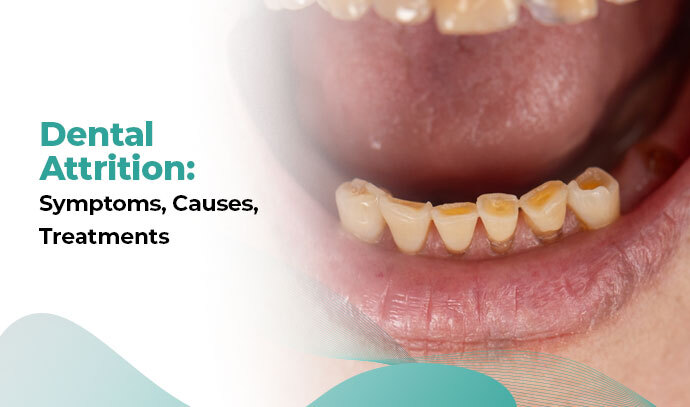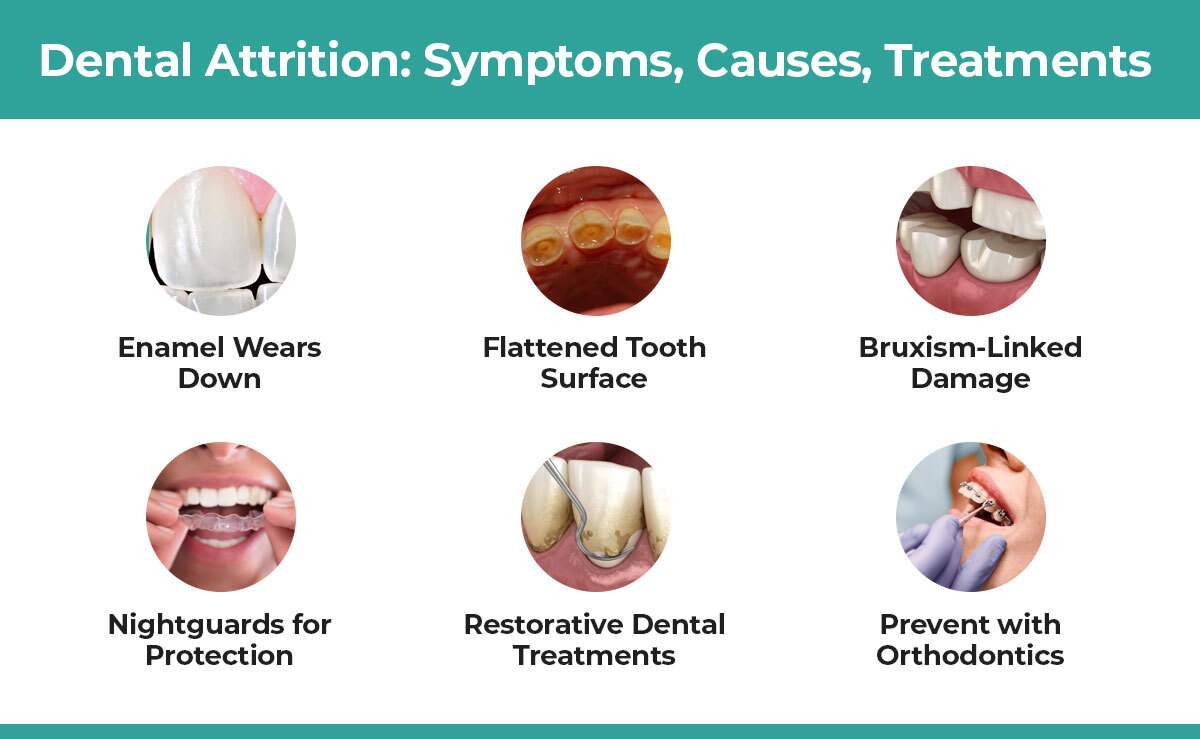
Dental Attrition: Symptoms, Causes, Treatments
Your teeth aren’t indestructible. Every time you chew, grind, or clench your jaw, a little bit of your enamel wears away. Over time, this natural wear can escalate into a more serious condition known as dental attrition, a silent destroyer of your smile and oral health.
While dental attrition is common, especially with age or lifestyle habits, it’s often misunderstood or mistaken for other dental issues. Left untreated, it can result in painful tooth sensitivity, bite misalignment, and even tooth loss. The good news? With the right knowledge and professional care, it’s entirely manageable.
In this blog, we’ll explore dental attrition symptoms, understand its root causes, dive into treatment options, and outline how to prevent further damage. Whether you’re searching for guidance or looking for expert help at a trusted dental clinic in Calicut or Kannur, this comprehensive guide is your first step to healthier teeth.
Understanding Dental Attrition
Dental attrition is the gradual loss of tooth structure due to tooth-to-tooth contact. Unlike erosion or abrasion, which result from acids or external forces, attrition is caused by the friction between teeth — typically from grinding, clenching, or an imbalanced bite.
It may not cause immediate discomfort, which is why many patients don’t realize the damage until it becomes severe.

Common Dental Attrition Symptoms
Noticing changes in your teeth but unsure what’s going on? Here are key dental attrition symptoms to watch for:
- Flattened or worn-down teeth
- Chipping or cracking of enamel edges
- Tooth sensitivity (especially to hot or cold foods)
- Yellowing teeth (due to exposed dentin)
- Loss of bite height (changes in facial structure or appearance)
- Jaw pain or TMJ discomfort
- Headaches or sore muscles from clenching/grinding
Early identification of these signs can help avoid irreversible damage and costly restorative procedures.
Dental Attrition Causes: Why It Happens
Dental attrition doesn’t just “happen” overnight. It’s usually triggered by underlying habits or conditions. Let’s break down the major dental attrition causes:
1. Bruxism (Teeth Grinding or Clenching)
One of the leading causes. Whether stress-induced or due to sleep disorders, bruxism exerts constant pressure, accelerating enamel wear.
2. Malocclusion (Poor Bite Alignment)
When teeth don’t align properly, certain areas endure more pressure, speeding up the wearing process.
3. Age and Natural Wear
Over time, regular chewing causes slow enamel wear. However, this process accelerates in those with thinner enamel.
4. Dietary and Lifestyle Factors
Hard or abrasive foods, frequent chewing of ice or pens, or even excessive use of teeth as tools can worsen attrition.
5. Genetic Predisposition
Some individuals naturally have softer enamel, increasing susceptibility.
6. Missing Teeth
When some teeth are missing, the others bear more pressure during chewing, leading to uneven wear.
Why You Shouldn’t Ignore Dental Attrition?
Unchecked dental attrition can lead to serious oral health complications:
- Increased tooth sensitivity and pain
- Shortened or flattened teeth
- Exposed dentin leading to decay
- Gum recession and periodontal issues
- Temporomandibular joint (TMJ) disorders
- Changes in facial aesthetics
- Difficulty chewing or speaking
The earlier the intervention, the simpler the solution.
Dental Attrition Treatments: From Relief to Restoration
The best dental attrition treatments depend on the severity of the wear and underlying causes. Here’s how experts address it:
1. Comprehensive Diagnosis
Before any treatment begins, your dentist will assess:
- Tooth wear patterns
- Bite alignment
- Jaw muscle activity
- Bruxism tendencies (sometimes using sleep studies)
2. Occlusal Splints or Night Guards
For patients who grind their teeth during sleep, a custom-made mouthguard (night splint) helps reduce enamel wear and protects teeth from further damage.
3. Orthodontic Correction
In cases of malocclusion, braces or aligners can realign your bite to distribute chewing forces more evenly.
4. Restorative Procedures
Depending on the tooth damage, restorative options may include:
- Dental Bonding – To reshape worn-down teeth with resin.
- Dental Crowns – For severely damaged or sensitive teeth, crowns provide full coverage and restore structure.
- Veneers – Ideal for aesthetic enhancement and minor reshaping.
- Onlays/Inlays – For moderate damage requiring more than a filling but less than a crown.
5. Tooth Replacement Options
If tooth loss has occurred due to attrition:
- Dental implants or
- Bridges can help restore function and prevent further wear on surrounding teeth.
6. Muscle Relaxant Therapies
In severe bruxism cases, muscle relaxant injections may be used to reduce clenching intensity.
Preventing Dental Attrition: Best Practices for Long-Term Oral Health
You don’t need to wait for damage to take action. Follow these preventive steps:
- Use a nightguard if you grind or clench your teeth.
- Address stress triggers that may contribute to bruxism.
- Schedule regular dental checkups for early detection.
- Maintain good oral hygiene to keep enamel strong.
- Avoid hard or chewy foods that cause unnecessary strain.
- Correct misaligned teeth through orthodontic treatments.
- Replace missing teeth promptly to maintain bite balance.
How Elite Dental Studio Supports Dental Attrition Care?
If you’re experiencing symptoms or suspect enamel wear, consult a dental expert promptly. Elite Dental Studio, a trusted dental clinic in Kannur and Calicut, offers tailored treatment plans backed by advanced diagnostics, modern equipment, and a compassionate team.
With a patient-first approach, they evaluate the root cause of your condition and create a customized roadmap for recovery — from nightguards and occlusal adjustments to full smile restorations.
Whether your goal is to relieve sensitivity, stop further damage, or restore aesthetics, Elite Dental Studio is committed to bringing back your confident, healthy smile.
When to See a Dentist for Dental Attrition?
Here’s when professional intervention becomes non-negotiable:
- You notice sharp edges or flattened areas on your teeth.
- You’re dealing with persistent sensitivity or unexplained jaw discomfort.
- You’re waking up with headaches or muscle tightness.
- Your teeth look shorter or your smile has changed over time.
- You’ve had a history of grinding or clenching.
Early evaluation can make all the difference in preventing advanced complications.
Protect, Preserve & Restore!
Your teeth were designed to last a lifetime, but only with the right care. Dental attrition, while common, doesn’t have to progress into something serious. By recognizing the early symptoms, understanding the causes, and exploring modern treatments, you’re already one step ahead in preserving your oral health.
If you’re based in Kerala and looking for reliable care, a reputable dental clinic in Calicut or Kannur like Elite Dental Studio can guide you through diagnosis, prevention, and long-term solutions.
Don’t let silent wear rob you of your confident smile. Prioritize your teeth today — because once enamel is gone, it doesn’t come back.
Frequently Asked Questions:
What is dental attrition and how is it different from erosion or abrasion?
Ans. Dental attrition is the gradual loss of tooth structure due to tooth-to-tooth contact, unlike erosion (caused by acids) or abrasion (caused by external forces like hard brushing).
What are the most common dental attrition symptoms I should look out for?
Ans. Look for signs like flattened teeth, tooth sensitivity, yellowing, jaw pain, or changes in your bite or facial structure.
Can dental attrition be reversed naturally?
Ans. No, once enamel is lost, it doesn’t regenerate. However, the effects can be managed and treated with professional dental care.
How is dental attrition treated in severe cases?
Ans. Treatments may include night guards, dental bonding, crowns, orthodontics, or even implants and veneers depending on the severity.
Is dental attrition painful?
Ans. It may not be painful in early stages but can lead to discomfort, sensitivity, and jaw pain as it progresses.
How can I prevent dental attrition in the future?
Ans. Using nightguards, correcting your bite, managing stress, and avoiding hard foods can help prevent attrition.
Have Dental Problem : Call us
CALICUT: +91 9745 072 555,
KOCHI: +91 9567 124 888
KANNUR: +91 9645874777
or make an Appointment
Take a smiling selfie and we'll Simulate your new smile See What Invisalign treatment could do for you!




